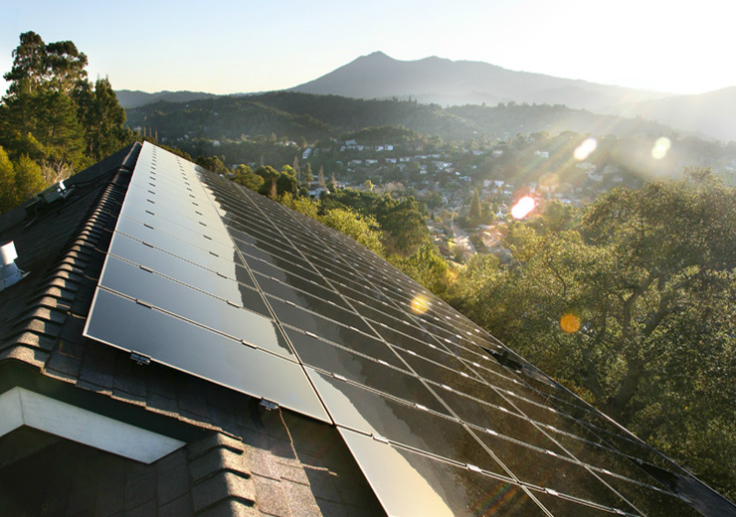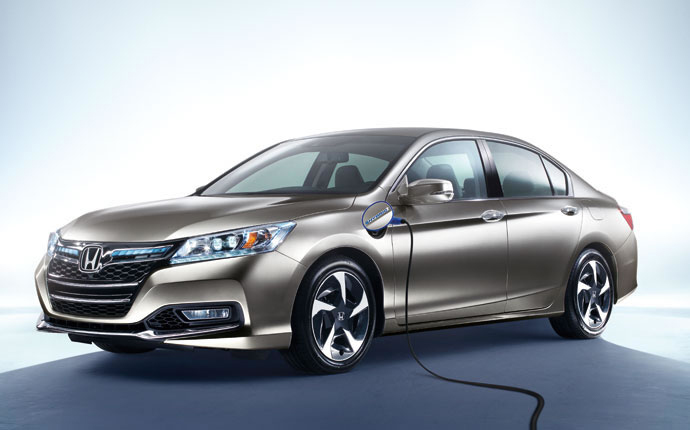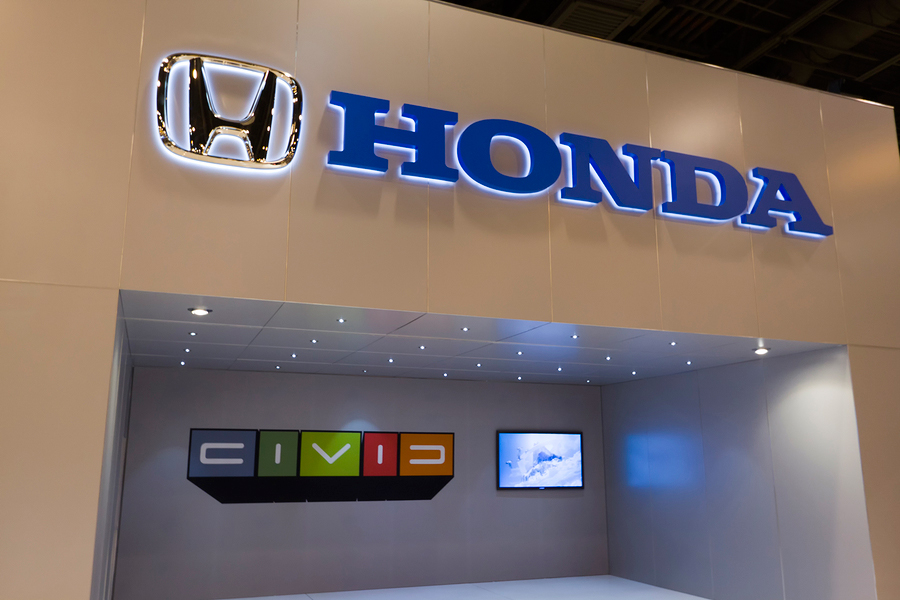Honda and Solar Energy
Air Date: Week of March 1, 2013

(Photo: Solar City)
The car company Honda has announced a new incentive plan to offer customers solar panels on their homes. Ryan Harty, American Honda’s assistant manager for environmental business development, tells host Steve Curwood that building solar infrastructure can help Honda meet it CO2 reduction goals, and might perhaps sell more electric vehicles in the future.
Transcript
CURWOOD: Zero percent financing. $1000 dollars cash back. Car sales people always seem to have some great incentive to get people into the showroom, and to sign on the bottom line. But Honda has come up with one that seems likely to benefit not only the potential car-buyer, but also the planet.
The car company has partnered with Solar City to offer customers in the 14 states where the installer operates photovoltaic panels for their homes at little or no cost. We called up Ryan Harty, assistant Manager of Honda's Environmental Business Development Office to find out what the company was thinking, and why it chose this kind of incentive.
HARTY: Honda has set an internal goal to achieve minus 50 percent CO2 reductions by 2050. By addressing the customers home electricity carbon dioxide reduction we can take a big big step towards that, as well as prepare the future market for electric vehicles, plug-in hybrid and home fueled hydrogen fuel cell vehicles in order for those vehicles to be refueled by renewable electricity at the customer’s home.

Honda Accord Plug-In Hybrid (Photo: American Honda Motors)
CURWOOD: So this isn’t a completely new idea – Ford partnered with Sunpower in 2011 to provide solar panels people who bought electric Ford Focus. How much of the Ford experience affects your approach?
HARTY: I believe that our program is exponentially larger than that. Our program reaches not just to our electric vehicle customers and the Accord plug-in hybrid customers, but very broadly to all of our automobile, Honda and Acura customers.
CURWOOD: So if I have a Honda motorcycle, I’m eligible?
HARTY: Absolutely. If you have a relationship with Honda through any product you purchased or just by searching for information our website, or if you called in, you'll be eligible to join our offer.
CURWOOD: What's in it for the customer here?
HARTY: Very simply, the customer gets to enjoy clean carbon-free electricity that they generate by themselves at a cost that’s less than what they were currently paying for utility power.
CURWOOD: That means that the electricity cost is fixed under this arrangement.
HARTY: The customer’s given a range of options. The zero down payment option will have an inflation escalator every year for the cost of the electricity they purchase. If the customer chooses to put some down payment, they will fix their electricity costs for the duration of the contract and obviously if they decide to pay cash themselves for the system then their electricity is free for the life of the system.
CURWOOD: Now tell me what comes with the solar panel installation. I imagine it might include an electric vehicle charging station?
HARTY: It could be if you are in the market for an electric vehicle. Our partner Solar City will investigate your house. They'll tell you about the different rates that your utility has for electricity for your electric vehicle. And also through our partner Leviton we would arrange the installation of an electric vehicle charging station at your home.
CURWOOD: So, what’s in this for Honda? How does it help Honda’s bottom line?

Honda and SolarCity are partners in providing $65 million in financing for solar panel installations. (Bigstockphoto.com)
HARTY: What's in it for Honda, right off the top, is a very modest financial return that Honda gets from this investment. But much more importantly is the connection that we make with our customer. We believe we're providing them with a product that will give them a joy of ownership for the next 20 years and beyond. The idea that they can wake up every single day and refuel their car and heat and cool their home with renewable electricity, and that they have Honda to thank for making that introduction is very valuable to Honda.
CURWOOD: So how does Honda make money on this deal?
HARTY: We make a very modest return on this deal by providing the capital to Solar City to install the systems. We make a certain return in the form of tax credits and depreciation from the system. Honda is an owner of all of the systems that will be installed in this program, and we take our return in the form of tax credits and depreciation.
CURWOOD: So it's like this leasing a car.
HARTY: Essentially, yes.
CURWOOD: So if there's ever a carbon tax, Honda will be, well, will have a whole bunch of credits.
HARTY: [LAUGHS.] That was not the consideration by going into this. This was not us thinking broadly about future carbon markets and trying to hedge against some impacts. We don't get any credits, we don't get any café credits for doing this. This is very much a pure greenhouse gas reduction activity by American Honda.
CURWOOD: How much is Honda putting into this project at this point?
HARTY: We haven’t disclosed the exact amount. Between Honda and Solar City, the total investment is $65 million dollars, as well as the incentive that the customers receive by doing this is an additional $400 per customer on top of the offer that Solar City happens to be running.
CURWOOD: Where exactly can people take advantage of this Honda program for these solar panels at no upfront cost?
HARTY: Any of the 14 states that Solar City has operations in the customers can partake in the program.
CURWOOD: So 14 states have it - that means that 36 don't. How soon will Honda expand to the entire country with this?
HARTY: Well, unfortunately, some states at this time do not allow third-party financing which is what this program is doing. Some states do not have net energy metering laws, which is necessary for the customer to get a financial benefit by installing solar panels. Some utility companies in certain states don't even allow customers to install solar panels. So this is very much a state-by-state, utility-by-utility market right now.
CURWOOD: How many people do you think are going to jump at this offer?
HARTY: We estimate 2500 to 3000 residential customers, plus ten to 20 of our dealerships.
CURWOOD: And I imagine you’re saying that it's going to sell out.
HARTY: We sure hope it's going to sell out. My dream is that it sells out quickly and I have to go back to our board and ask for more money.
CURWOOD: Ryan Harty is the Assistant Manager of the Environmental Business Development Office of American Honda.Thank you so much Ryan.
HARTY: Thank you very much.
Links
Living on Earth wants to hear from you!
Living on Earth
62 Calef Highway, Suite 212
Lee, NH 03861
Telephone: 617-287-4121
E-mail: comments@loe.org
Newsletter [Click here]
Donate to Living on Earth!
Living on Earth is an independent media program and relies entirely on contributions from listeners and institutions supporting public service. Please donate now to preserve an independent environmental voice.
NewsletterLiving on Earth offers a weekly delivery of the show's rundown to your mailbox. Sign up for our newsletter today!
 Sailors For The Sea: Be the change you want to sea.
Sailors For The Sea: Be the change you want to sea.
 The Grantham Foundation for the Protection of the Environment: Committed to protecting and improving the health of the global environment.
The Grantham Foundation for the Protection of the Environment: Committed to protecting and improving the health of the global environment.
 Contribute to Living on Earth and receive, as our gift to you, an archival print of one of Mark Seth Lender's extraordinary wildlife photographs. Follow the link to see Mark's current collection of photographs.
Contribute to Living on Earth and receive, as our gift to you, an archival print of one of Mark Seth Lender's extraordinary wildlife photographs. Follow the link to see Mark's current collection of photographs.
 Buy a signed copy of Mark Seth Lender's book Smeagull the Seagull & support Living on Earth
Buy a signed copy of Mark Seth Lender's book Smeagull the Seagull & support Living on Earth

